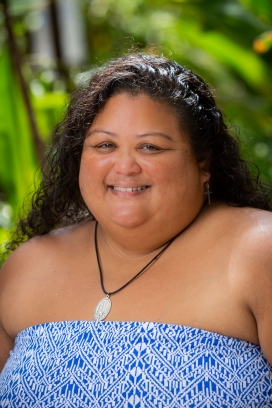Malia K.H. Akutagawa '97
- Associate Professor of Law
- William S. Richardson School of Law – Ka Huli Ao Center for Excellence in Native Hawaiian Law
- Hui ʻĀina Momona
- Hawai'inuiākea School of Hawaiian Knowledge
Degrees
- BA Whitworth University 1993
- JD William S. Richardson School of Law 1997
Biography
Malia Akutagawa is an Associate Professor of Law and Hawaiian Studies with both the University of Hawaiʻi at Mānoa’s Hawaiʻinuiākea School of Hawaiian Knowledge – Kamakakūokalani Center for Hawaiian Studies and the William S. Richardson School of Law. Malia earned Baccalaureate degrees in Philosophy and Biology from Whitworth University in 1993. Malia is a 1997 alumna of the William S. Richardson School of Law, having earned a Juris Doctor and Environmental Law Certificate. She was admitted into the Hawaiʻi State Bar Association in 1998.
Malia was an attorney with the Native Hawaiian Legal Corporation where she worked on Hawaiian access, gathering, burial, land use and water rights cases. She represented Protect Keopuka ʻOhana in the Kelly v. Oceanside case regarding improper use of agriculture land and the destruction of the ancient Alaloa trail and numerous ancient Hawaiian burials in South Kona, Hawaiʻi Island. She also assisted Aunty Pele Hanoa and ʻohana of Punaluʻu Preservation in their bid to care for and manage Punaluʻu on Hawaiʻi Island. Malia worked with clients of Na Moku Aupuni o Koʻolau Hui, taro growers and cultural practitioners of multiple east Maui ahupuaʻa from Honopou to Hana, in their opposition to continued stream and watershed diversions by former sugar plantation operations.
Malia’s scholarship includes State and federal laws protecting iwi kūpuna (Native ancestral burials), preserving cultural and historic sites, and engaging Native communities and stakeholders in consultation on these matters. Malia is also involved in community-based resource management efforts along traditional land divisions (ahupuaʻa) and district/regional (moku) levels within the context of State watershed management partnerships and Community Based Subsistence Fishing Areas (CBSFAs). Malia is particularly interested in the integration of Native, Indigenous Hawaiian methodologies, customary law, and governance principles founded by the ancient ʻAha Kiole (People’s Councils) and incorporated into law under the Statewide ʻAha Moku Advisory Committee (AMAC). The AMAC is comprised of representatives from each of the eight main Hawaiian islands. It advises the State Department of Land and Natural Resources (DLNR) on Indigenous best practices for the management of natural resources in Hawaiʻi.
Malia is part of Hui ʻĀina Momona, a consortium of scholars throughout the university community charged with addressing compelling issues of indigenous Hawaiian knowledge and practices, including the legal regime and Native Hawaiian rights associated with mālama ʻāina, and with focus on cross-disciplinary solutions to natural and cultural resource management, sustainability, and food security.
Publications
Malia Akutagawa, An Island Negotiating a Pathway for Responsible Tourism, in DETOURS: A DECOLONIAL GUIDEBOOK TO HAWAIʻI (Hokulani Aikau, Vernadette Gonzalez, eds.) (2019). ResearchGate
Harmonee Williams, Emillia Noordhoek, Malia Akutagawa, Sustʻāinable Molokai Energy Assessment (2014). ResearchGate
Natasha Baldauf & Malia Akutagawa, HOʻI HOU I KA IWIKUAMOʻO: A LEGAL PRIMER FOR THE PROTECTION OF IWI KŪPUNA IN HAWAIʻI NEI, (Ka Huli Ao Center for Excellence in Native Hawaiian Law, 2013). ScholarSpace
Akutagawa, Malia, Lahela Han, Harmonee Williams, Emillia Noordhoek, Sustʻāinable Molokai – Molokai Agriculture Needs Assessment, May 2012. ResearchGate | ScholarSpace
Cultivation of Gracilaria parvispora (Rhodophyta) in shrimp-farm effluent ditches and floating cages in Hawaii: a two-phase polyculture system. Stephen G. Nelson; Edward P. Glenn, Jeff Conn, David Moore, Ted Walsh and Malia Akutagawa - Aquaculture - IF:1.678 - 193 (3) - 2001/02/01 ResearchGate
Correlation between Gracilaria parvispora (Rhodophyta) biomass production and water quality factors on a tropical reef in Hawaii. Edward P. Glenn; David Moore, Malia Akutagawa, Anna Himler, Ted Walsh and Stephen G. Nelson - Aquaculture - 178 (3) - 1999/08/01 ResearchGate
Manny Kuloloio, Kehau Walker, Malia Akutagawa, Davianna Mcgregor, Noa Aluli, Contemporary Subsistence Fishing Practices Around Kahoolawe (1997). ScholarSpace
Jon Matsuoka, Davianna McGregor, Luciano Minerbi, Malia Akutagawa, "Governor's Moloka'i Subsistence Task Force Report," Moloka'i Department of Business, Economic Development, and Tourism, 1993. ScholarSpace

